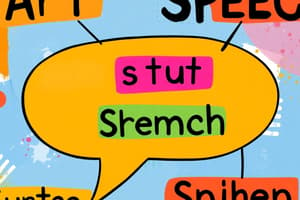Podcast
Questions and Answers
Which of the following is an example of a proper noun?
Which of the following is an example of a proper noun?
- dog
- London (correct)
- city
- freedom
All verbs are action words.
All verbs are action words.
False (B)
What part of speech is the word 'quickly'?
What part of speech is the word 'quickly'?
Adverb
An example of a personal pronoun is ______.
An example of a personal pronoun is ______.
Match the following parts of speech with their definitions:
Match the following parts of speech with their definitions:
Which of these is NOT a type of adjective?
Which of these is NOT a type of adjective?
An adverb can modify nouns.
An adverb can modify nouns.
What is the purpose of a preposition?
What is the purpose of a preposition?
The word 'and' is an example of a ______.
The word 'and' is an example of a ______.
Which option is a reflexive pronoun?
Which option is a reflexive pronoun?
Flashcards are hidden until you start studying
Study Notes
Parts of Speech
-
Noun
- Definition: A word that represents a person, place, thing, or idea.
- Types:
- Common (e.g., dog, city)
- Proper (e.g., London, Sarah)
- Abstract (e.g., love, freedom)
- Concrete (e.g., apple, mountain)
-
Pronoun
- Definition: A word that replaces a noun to avoid repetition.
- Types:
- Personal (e.g., he, she, it)
- Possessive (e.g., his, her, their)
- Reflexive (e.g., myself, themselves)
- Demonstrative (e.g., this, those)
-
Verb
- Definition: A word that expresses action or a state of being.
- Types:
- Action (e.g., run, eat)
- Linking (e.g., is, seem)
- Auxiliary (e.g., have, will)
-
Adjective
- Definition: A word that describes or modifies a noun.
- Types:
- Descriptive (e.g., blue, tall)
- Quantitative (e.g., several, few)
- Demonstrative (e.g., this, those)
- Possessive (e.g., my, your)
-
Adverb
- Definition: A word that modifies a verb, adjective, or another adverb.
- Types:
- Manner (e.g., quickly, softly)
- Time (e.g., now, later)
- Frequency (e.g., often, rarely)
- Degree (e.g., very, quite)
-
Preposition
- Definition: A word that shows the relationship between a noun (or pronoun) and another word in a sentence.
- Examples: in, on, at, by, with
-
Conjunction
- Definition: A word that connects words, phrases, or clauses.
- Types:
- Coordinating (e.g., and, but, or)
- Subordinating (e.g., because, although)
- Correlative (e.g., both...and, either...or)
-
Interjection
- Definition: A word or phrase that expresses strong emotion or surprise.
- Examples: oh, wow, ouch, hey
Usage Tips
- Identifying parts of speech can help in understanding sentence structure.
- The role of a word in a sentence often determines its part of speech.
- Some words can function as multiple parts of speech depending on context (e.g., "run" as a noun or verb).
Parts of Speech Overview
-
Nouns represent people, places, things, or ideas with various types:
- Common nouns refer to general items (e.g., dog, city).
- Proper nouns denote specific names (e.g., London, Sarah).
- Abstract nouns indicate concepts or qualities (e.g., love, freedom).
- Concrete nouns signify tangible items (e.g., apple, mountain).
-
Pronouns replace nouns to reduce repetition, categorized into:
- Personal pronouns represent specific individuals (e.g., he, she, it).
- Possessive pronouns indicate ownership (e.g., his, her, their).
- Reflexive pronouns refer back to the subject (e.g., myself, themselves).
- Demonstrative pronouns point out specific items (e.g., this, those).
-
Verbs convey action or state of being, divided into:
- Action verbs express physical or mental actions (e.g., run, eat).
- Linking verbs connect the subject to further information (e.g., is, seem).
- Auxiliary verbs assist main verbs in forming tenses (e.g., have, will).
-
Adjectives modify nouns, explaining or qualifying them through:
- Descriptive adjectives provide details (e.g., blue, tall).
- Quantitative adjectives express amounts (e.g., several, few).
- Demonstrative adjectives highlight specific nouns (e.g., this, those).
- Possessive adjectives show ownership (e.g., my, your).
-
Adverbs modify verbs, adjectives, or other adverbs, categorized as:
- Manner adverbs describe how actions are performed (e.g., quickly, softly).
- Time adverbs indicate when an action occurs (e.g., now, later).
- Frequency adverbs reveal how often something happens (e.g., often, rarely).
- Degree adverbs specify the extent of an action (e.g., very, quite).
-
Prepositions illustrate relationships between nouns (or pronouns) and other words in a sentence, such as:
- in, on, at, by, and with.
-
Conjunctions link words, phrases, or clauses, classified into:
- Coordinating conjunctions connect similar elements (e.g., and, but, or).
- Subordinating conjunctions introduce dependent clauses (e.g., because, although).
- Correlative conjunctions work in pairs to join elements (e.g., both...and, either...or).
-
Interjections convey strong emotions or spontaneous reactions, examples include:
- oh, wow, ouch, hey.
Usage Tips
- Identifying parts of speech enhances understanding of sentence structure and composition.
- The function of a word within a sentence determines its specific part of speech.
- Many words are flexible and can operate as different parts of speech depending on context (e.g., "run" can be both a noun and a verb).
Studying That Suits You
Use AI to generate personalized quizzes and flashcards to suit your learning preferences.




